Learning to
Number Our Days

Canadian Pastor Arrested
Tuesday, word came out that Edmonton pastor James Coates, graduate of Master’s Seminary of Los Angeles and pastor of GraceLife Church which I wrote about two weeks ago, has been arrested and jailed for his failure to comply with Alberta’s COVID lockdown requirements. He is being represented by the Justice Centre for Constitutional Freedom who has appealed to Alberta Premier Jason Kenney to release Pastor Coates unconditionally. The church has been warned repeatedly to stop holding large, in-person gatherings and it has repeatedly ignored that order, believing their duty to God supersedes their duty to the state. The history of the church’s efforts to remain open is laid out here. Pastor Coates presented his argument for remaining open in his recent sermon. He argued that the evangelical church has taken a legalistic approach to the Scriptures in that, unless the Scripture explicitly addresses the current situation, not merely by implication, the church is under obligation to the state not the Scripture.
Pastor Jacob Reaume of Trinity Bible Chapel in Waterloo was forced to abide by the COVID related Reopening Ontario Act. Yesterday he interviewed the lawyer, James Kitchen, who is representing Pastor Coates about the situation. Kitchen laid out the events of the week as it pertains to Pastor Coates. The church held its normal service on Sunday February 14th. An Alberta public health official came and reported the violations. Monday the RCMP asked Coates to voluntarily surrender himself to them which he did on Tuesday. When he appeared before the justice of the peace, the JP was willing to release the pastor provided the agree to stop performing his pastoral duties as he had been doing. Pastor Coates could not agree to these terms and was remanded, apparently until the matter is resolved which may be days or even weeks away.
With the jailing of Pastor Coates, the situation in Canada over religious freedom has been elevated significantly. American churches who defied COVID lockdown restrictions have found some legal protection, if not complete agreement, as the case of Grace Community Church of Los Angeles indicates. But the situation in Canada is decidedly different. While Canadians have The Charter of Rights and Freedoms, the legal interpretation of those rights have been less sympathetic across the nation generally as it relates to the COVID restrictions. Churches have been forced into compliance with extreme fines looming and now incarceration if they fail to yield. That is until yesterday.
Further to the west of Alberta in British Columbia, churches received some good news. Chief Justice Christopher Hinkson of the BC Supreme Court denied an injunction request from the provincial Attorney General and Health Minister, Dr. Bonnie Henry, against three Fraser Valley churches who were attempting to maintain in-person services. This denial is not the end of the matter, only a temporary respite. The churches filed a petition against the province for infringement of their religious rights under the Charter which is set to be heard in March.
The stories of these churches are far from over. With legal questions and potential fines pending in several provinces and COVID still a problem, who but God knows where this will end up. Ironically, Ontario churches (some at least) are facing a relaxing of restrictions this coming Sunday. My former church will be open for the first time since before Christmas at thirty percent occupancy, meaning they will hold two Sunday services to accommodate those who wish to attend.
We need to keep our Canadian brethren in prayer. It is easy to stand back and criticize or commend what is going on across the border, but the consequences of these court challenges may have far reaching implications for the church in Canada. The case of James Coates could be precedent setting and influence other church related cases down the road. We need to pray for Coates, his family and his church, who are standing with him in this matter. Apparently, the church has seen an increase in attendance as a result of their stand. Will this continue if the pastor stays in jail and the levied fines become unbearable? God help these brethren
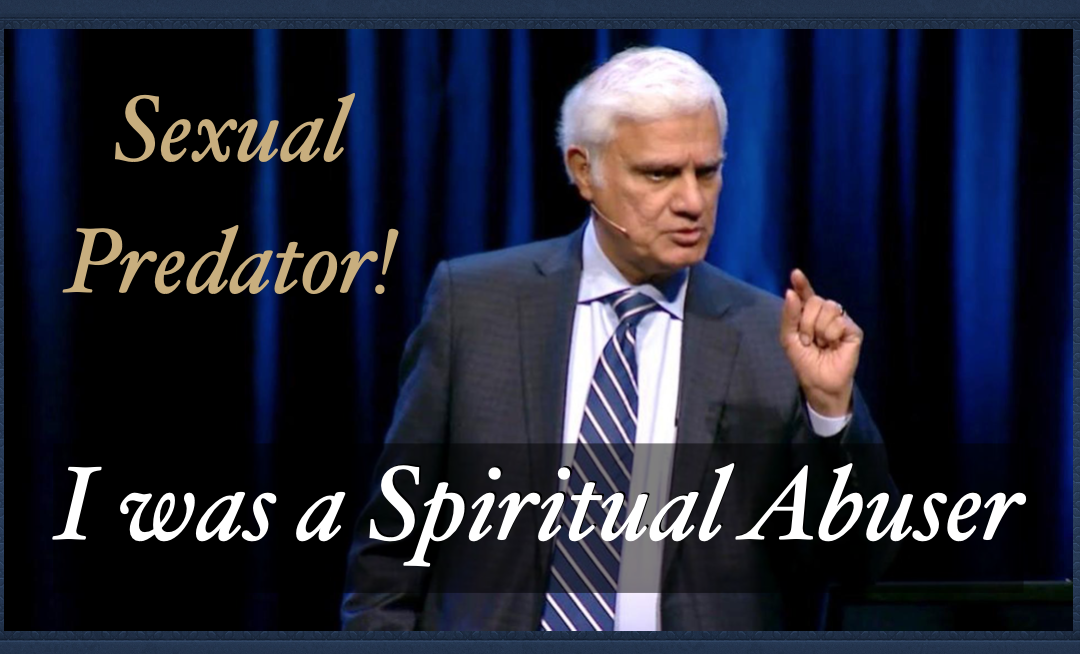
A Letter to My Brothers
Last Thursday was a very sad day for the evangelical church. The long-awaited report on the sexual misconduct of Ravi Zacharias was released confirming the worst sort of duplicity and moral failure. For years, Ravi, a well-known international Christian apologist, led a double life. While he presented himself as a pious, Christ-loving disciple, he was really a sexual deviant. I won’t rehearse his failings. They are now well-known, and the details are difficult to read. For many of us, we should avoid reading about them all together. The Scripture exhorts us to think on what is good and decent (Php 4:8), not what is corrupt and wicked. So, why even write about this story at all?
My goal this week is to offer to the men whom God has given me the joy and privilege to help train for ministry and with whom I travel that journey a reminder yet again of the importance of walking a circumspect life when it comes to our personal moral integrity. Let him who thinks that he stands, take heed lest he fall (1 Cor. 10:12). All of us are one step away from utter destruction. Sin takes us further than we ever intended to go. It keeps us longer than we ever intended to stay; and it costs us more than we ever intended to pay. We need to remind ourselves and each other of the high cost of unholy living.
I have never been a follower of Ravi, although I have heard him on a number of occasions, and he did have a gift for communication. Giftedness without godliness—what a tragedy! My youngest son liked Ravi and read his books. When news of these revelations came to light last year, he was saddened as was I. I wonder why God allowed Ravi to die before his sin was known publicly. Ravi died in May 2020 but the serious disclosures about his extensive misdeeds didn’t begin to emerge until October, although rumors began to surface as far back as 2017. The evangelical church has been rightly castigated for failing to consider seriously these allegations back then. Hero worship keeps abusers in power. We’ve seen it again and again. I won’t dwell on the details, but I do want to offer a series of remedies to keep my brothers and I from following in his footsteps. As ministers, we must be ever vigilant lest we plunge headlong into sin and ruin our lives and hurt so many around us.
Keep your wife close and be accountable to her. There should be no secrets between you and your wife. No hidden files, rooms, boxes, or places where you can retreat to get away from it all. She should have unfettered access to your computer and be fully in the loop of your schedule and meetings. She is your greatest friend and asset in your war against the flesh. She will also be one of your greatest losses if you fail, so keep her close. Be transparent with your wife. (Prov. 5:18)
Be transparent and open. Be accountable. You not only have to do right, but you have to appear to do right. Find an accountability partner in ministry who will hold your feet to the fire. Pray with him or them and for him or them. There is safety in numbers. Get someone with courage to ask you the hard questions, to probe for clarity and admonish you if something seems amiss. A timid accountability partner does you no good. This may also include software like Covenant Eyes. It monitors your internet activity and sends the details to someone who can hold you accountable. If you fail, admit your sins and repent.
Don’t go it alone. Do not visit alone and do not counsel alone, ever! Am I speaking hyperbolically? Perhaps. You can visit a man alone and no one will care. But you must take precautions against being in a situation where you will be alone with a woman not related to you. Put a window in your office door so that what you are doing can be seen by others. As a pastor of a small church, I was often at the building alone. Occasionally a woman would stop to see me, a practice I never encouraged. If I saw one drive in the driveway, I would call my wife and ask her to come to the church immediately. She knew the reason. Do everything you can do to protect yourself.
Avoid physical contact. There are some people who are touchy-feely people. They love to embrace and may give you a hug at the drop of a hat. Discourage this. I once had a woman in my church give me a hug on the way out the door one Sunday, unexpectedly. My response when it happened was to stand stiff. She said, “You don’t hug much, do you?” I really didn’t. Sometimes I may give someone a gentle side hug in the presence of my wife, but I try to avoid physical contact, with women and with girls. Yes, even with girls.
Remind yourself periodically of this important issue. I was alerted to the report on Ravi last Friday when I read a very good essay by Randy Alcorn who has spoken out about ministerial failure before. Randy’s stuff on ministerial integrity/failure is some of the best I know of. I am always glad to read it myself and point others to it. We in ministry can never remind each other often enough of our need for careful living. Finishing well should be the goal for all, but sadly, some do not end their journeys well. Ravi certainly didn’t and this should be a warning to us all. He who has ears to hear, let him hear! Read what others have to say, such as John Armstrong, Can Fallen Pastors Be Restored? or Stan Grenz, Betrayal of Trust or Richard H. Swartley, A Wolf in the Pulpit. Also Porn and the Pastor, ed. Jeff Robinson and Garrett Kell. Keep warning yourself of the need to walk circumspectly as Paul reminded us in Eph 5:15–16. Remember, God knows your life and judgment will come!
Keep a warning list. I have periodically written on ministerial moral faithfulness. In the essay, I mentioned a list I keep of acquaintances I have known over the years of ministry whose ministries have been lost because of their personal moral failures. The list is neither for discussion with others nor is it for public view. It is a reminder to me of just how easy it is to “stray” from the path and end up in utter disaster. Stray is really the wrong word here. No one takes a wrong turn accidently. Someone deliberately ignores a warning sign and heads toward ruin, perhaps thinking “I am just curious, I won’t linger long.” But then they are ensnared, and chaos ensues. You cannot go down the wrong path if you never start on it. Beware!
Over the years, I have interacted with men who struggle. With the advent of the internet, this struggle was made easier. When I was young, you had to go somewhere to find ungodly material. Now it is a click away in the privacy of your home or office. Once addicted, it becomes difficult to escape. I had a parishioner, in the early days of the internet, who was an IT guy. He called me one night full of anxiety. He couldn’t sleep. He feared he would have a stroke. I knew that his son had been expelled from a Christian college for porn on his computer. I knew this man spent a lot of time on the computer for work. So, I asked him, “Are you having trouble on the internet?” “Everyday, at lunch” came the reply. Sadly, the man never got victory in this area of his life. He went from one sin to the next until today he is involved in the most vile forms of depravity.
In the same way, Ravi started down a path that led him into a world of twisted thinking and sexual depravity. The great tragedy is that he was an international figure with a global ministry. Going forward, he will be a global example of the ravages of sin and deceit. Because his personal life was a fraud, many will think that his message of divine grace was also false! May God grant us the grace to walk circumspectly, the courage to repent when we need to and the wisdom to seek help if we are ensnared. No matter how bad things are it is never too late to do the right thing. May God strengthen us to do so.
An Afterword: This essay focuses on ministry men and the dangers of moral failure. Another essay should be written on the damage that ministerial failure produces in the lives of those with whom the man sins or, in many cases, abuses—significant, life-altering, personal and spiritual damage. The law of unintended consequences comes into play in the aftermath of our moral turpitude. He that has ears to hear, let him hear!
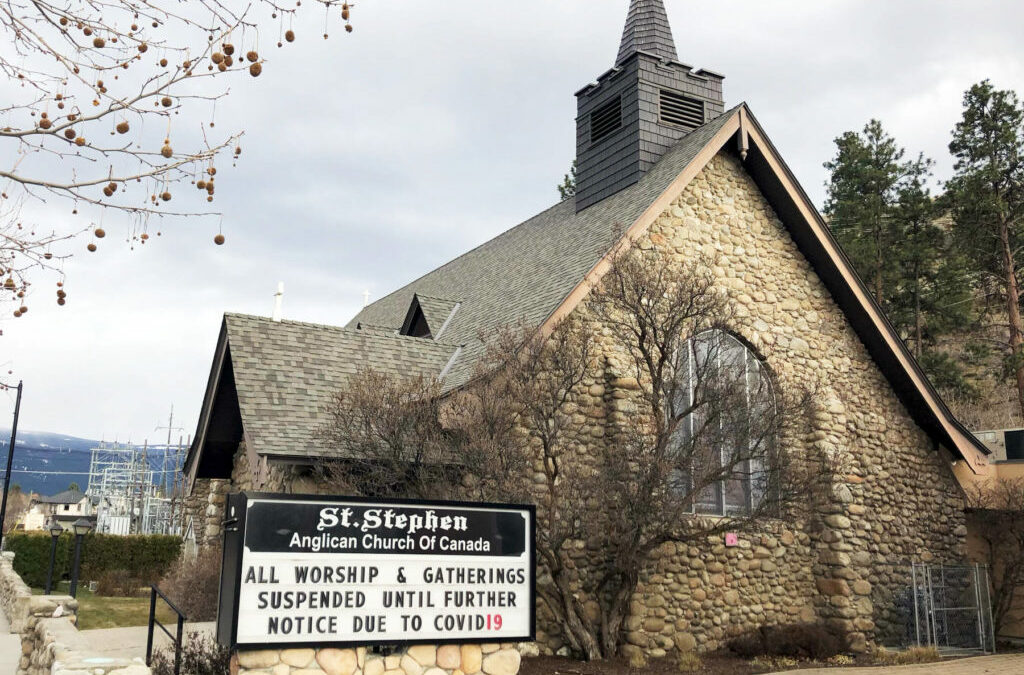
Difficult Days for Our Canadian Brethren
We are now a year into the COVID pandemic and although vaccines have been rolling out for Americans and the Brits, much of the rest of the world is waiting in a long line to receive major shipments of one of these potentially lifesaving elixirs. Americans have two available vaccines—Moderna and Pfizer with a third from Johnson and Johnson, seemingly days away from government approval. Predictions are that, with the approval of the latest vaccine, every American who wants a shot will have one available by June. It is too early to know when we will reach “herd immunity,” and if this is a temporary fix or if we will need annual shots to keep us immune. These are uncertain days to be sure.
Our neighbours to the north are in a different situation. Canada has no vaccine manufacturing capacity at this point, so they will need to secure doses from American suppliers. Naturally, these same suppliers are showing preferential treatment to Americans because of national interests. This leaves Canadians more vulnerable as they await the arrival of significant doses to meet their population’s needs. A vaccine from Astra Zeneca is scheduled to be approved by Health Canada in mid-February. According to estimates, Americans currently are vaccinating ten times more people than Canada (Canada is .05 people per 100 daily while the US is .45 people per 100 population). The UK has vaccinated 5x the number of its citizens proportionately. All of this made Canada 20th in the list of developed nations to get its citizens vaccinated at the end of January.
Of course, this is unwelcome news for Canadian citizens, but it also places an even greater hardship on Christians north of the border who are facing more stringent COVID-driven church closures. Beginning on Boxing Day (December 26th), Ontario Christians, under the Reopening Ontario Act, were prohibited religious, in-person gatherings of over ten people. This effectively meant churches could not assemble as a church until further notice. At the same time, big-box stores could operate at 25% capacity while grocery stores and pharmacies could permit 50% occupancy.
A handful of Ontario churches as well as churches across western Canada felt that these restrictions were both contrary to The Charter of Rights and Freedoms and inconsistent—big-box stores are essential, but churches are not? Why are churches not given equal consideration? A few church leaders decided that, under The Charter, they did have the right to meet and chose to do so, defying government shut-down orders. In recent days, one church has been in the news prominently for continuing to hold services, despite the restrictions.
Trinity Bible Chapel of Waterloo, led by Jacob Reaume, a Southern Seminary MDiv graduate, now faces contempt of court charges and fines that could reach $10 million. Present at their last in-person meeting was a member of Ontario’s Parliament, Randy Hillier, who joined the group as a sign of solidarity. The church is being defended by Lisa Bildy from the Justice Centre for Constitutional Freedoms who hopes to make an argument for the church using The Charter. The church recently received a contempt charge for its failure to comply. After heavy possible fines were pending ($10,000 to $100,000 for each of the six elders and fines for the church), the church agreed to suspend further in-person meetings, until the lifting of the closure order. For now, however, there will be drive-in meetings instead.
 The other Ontario church in the news for months is a church in Aylmer led by Henry Hildebrant, the Church of God. Lately, the church service started with a drive-in service, but the pastor led a group of people into the building, defying the lock-down restrictions. This resulted in some people receiving tickets of $880. Again, the issue is consistency and The Charter. Why can some businesses open while churches have very tight restrictions? The church continued to meet, defying government restrictions and fines were levied against some who attended. The Ontario Attorney General issued a cease-and-desist order, demanding the church comply. Interestingly, no arrests have been made to force compliance.
The other Ontario church in the news for months is a church in Aylmer led by Henry Hildebrant, the Church of God. Lately, the church service started with a drive-in service, but the pastor led a group of people into the building, defying the lock-down restrictions. This resulted in some people receiving tickets of $880. Again, the issue is consistency and The Charter. Why can some businesses open while churches have very tight restrictions? The church continued to meet, defying government restrictions and fines were levied against some who attended. The Ontario Attorney General issued a cease-and-desist order, demanding the church comply. Interestingly, no arrests have been made to force compliance.
A church in Alberta, Fairview Baptist Church, led by Tim Stephens, was planning a similar strategy of defiance for biblical and legal reasons but has since decided that the church will remain closed for the duration of the COVID pandemic in accordance with provincial legal requirements. Meanwhile, on Monday, a church in Edmonton was charged with violating Alberta’s closure rules, apparently repeatedly. Its pastor was arrested by the RCMP.
This week, word came from British Columbia that its provincial health minister is seeking an injunction against three churches, Riverside Calvary Chapel of Langley, Immanuel Covenant Reformed Church of Abbotsford, and the Free Reformed Church of Chilliwack, who continue to defy the lockdown rules. Calgary-based Justice Centre for Constitutional Freedoms petitioned the British Columbia Supreme Court to consider whether or not BC’s rules violates Canada’s Charter of Rights and Freedoms.
All of this comes with other measures recently imposed on Canadians. Last week, Canadians were told they could expect a three-day quarantine at designated hotels on their return to Canada by air at a cost of $2000 for which they are responsible. Flights have been canceled between Canada and Mexico or the Caribbean. Some Canadians, intent on escaping winter, travel to the US by helicopter, their cars being transported across the border, so that they can then drive south to escape the cold.
Having pastored in Canada for nineteen years, I have wondered how I might have handled this situation if I were still a pastor there. My former church, Emmanuel Baptist Church of Windsor, Ontario, is complying with the Ontario restrictions and ministering to the church online. Pastor Scott recognizes the limited nature of these meetings, but he and church leaders are attempting to make the best of a difficult situation. Everyone recognizes that there are some things that cannot be done in online formats. At the same time, Kevin told me recently of unique ministry opportunities the Lord has afforded him because of these lockdowns.
One of the issues compounding the situation in Canada is the limited availability of COVID vaccines. Moderna was not expected to deliver any doses of the vaccine to Canada this week, leaving the country with only 70,000 doses remaining. Part of the challenge is that to date, there are only two approved vaccines in Canada. Canada hopes to get 335,000 doses next week and 400,000 doses the following week. With only a small percentage of the population having received the vaccine coupled with new strains of the virus entering Canada (experts predict that by the spring, the UK-variant will be dominant), there seems little Canada can do but to hunker down and tighten restrictions as they weather the storm.
Churches are caught in the crossfire. Even here in the United States, with COVID vaccines ramping up, there is still a big measure of uncertainty. School boards are wrestling with the desire to reopen to in-person learning. Conferences are trying to determine whether to plan in-person meetings. And churches are looking forward to the day when things will return to “normal” whatever normal is. These are unprecedented days for our brothers and sisters north of the border. Lord, teach us to number our days!
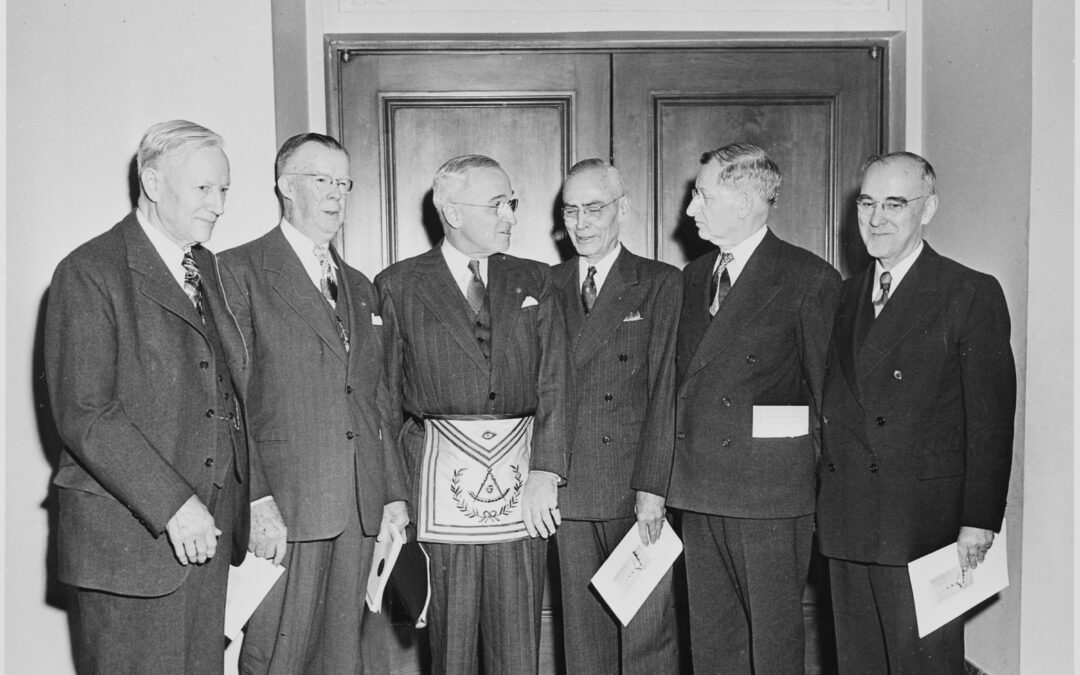
Baptists and Freemasonry? Can a Christian Be a Faithful Believer and Be a Freemason?

For many Christians, this may seem like an odd question. If their journey is similar to mine, they may know little or nothing about freemasonry. My dad wasn’t a freemason . . . that I know of, nor was anyone in my family, on either side. Again, not that I know of. What are freemasons to me? I have heard about them for years, but seldom given them a thought.
Freemasonry has been a part of the American experience since before nationhood. George Washington, Paul Revere, Benjamin Franklin and others in the earliest days of our nation were a part of the fraternity. Eight of the fifty-six founding fathers were freemasons as well as fourteen of our forty-six presidents, including Harry Truman, a Baptist as well as a mason.
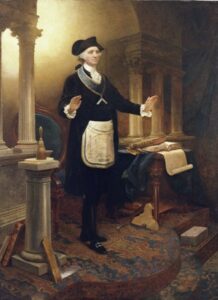 Among the list of prominent freemasons globally are the names Samuel Clemens, aka Mark Twain, American literary figure; Winston Churchill, former Prime Minister of England; Earl Warren, former Chief Justice of the Supreme Court; John Glenn, American astronaut and former US Senator; and J. Edgar Hoover, former Director of the Federal Bureau of Investigation. Freemasonry has a robust presence in American life.
Among the list of prominent freemasons globally are the names Samuel Clemens, aka Mark Twain, American literary figure; Winston Churchill, former Prime Minister of England; Earl Warren, former Chief Justice of the Supreme Court; John Glenn, American astronaut and former US Senator; and J. Edgar Hoover, former Director of the Federal Bureau of Investigation. Freemasonry has a robust presence in American life.
However, freemasonry, as a “secret society,” has been a problem for many Christian groups, perhaps with good reason. As one rises in the ranks of freemasonry, there are certain “secrets” that one learns that are not to be shared with non-masons. Aspects of their ritual are shrouded in secrecy. With the advent of things like the internet, few secrets remain for the world of masonry. But this secrecy is one of the reasons many Christian groups reject freemasonry.
In 2009, the Christian Missionary Alliance adopted a report that declared that freemasonry, as a secret society, “is not compatible with confession of faith in the Lord Jesus Christ.” Included in the report to their denomination was a list of other Christian groups who have formally espoused similar positions on freemasonry including the Roman Catholic Church, various Lutheran groups such as the Wisconsin Evangelical Lutheran Synod, Orthodox churches, various Presbyterian groups, some Methodist groups, the Assemblies of God, and others.
Strangely missing from the list of the CMA cobelligerents against freemasonry is any significant Baptist group. The two exceptions are the General Association of Regular Baptists and the Baptist Union of Scotland. What about the Southern Baptists? The CMA report goes on to summarize the history of the SBC regarding freemasonry. The issue was put before the Convention in 1992. As a result, the question was studied and a report was presented the following year. The report spoke of the incompatibility of freemasonry with Baptist doctrine along eight lines. Yet despite the negative report, the SBC Home Mission Board recommended to the Convention that “in light of the fact that many tenets and teachings of Freemasonry are not compatible with Christianity and Southern Baptist doctrine, while others are compatible with Christianity and Southern Baptist doctrine, we therefore recommend that consistent with our denomination’s deep convictions regarding the priesthood of the believer and the autonomy of the local church, membership in a Masonic Order be a matter of personal conscience. Therefore, we exhort Southern Baptists to prayerfully and carefully evaluate Freemasonry in the light of the Lordship of Christ, the teachings of the Scripture, and the findings of this report, as led by the Holy Spirit of God.” The SBC took no united action in the matter of freemasonry, although they have sought to clarify their statement. The North American Mission Board has also tried to show the real problems with freemasonry. Despite these actions, Southern Baptists have not responded with one voice on this matter, as individual churches have continued to have conflict over the issue. Many freemasons remain committed to both their church and freemasonry.
All of this may be interesting reading, a discussion of an obscure aspect of Christian history that many believers have little connection with. Why should this occupy my thinking these days and why should this occupy an essay this week? My first real acquaintance, up close and personal, with freemasonry came at a funeral several years ago at a Baptist church in Georgia. At the internment service, the man being laid to rest was given a funeral burial ceremony by his Masonic brothers. It was interesting with their white aprons and sprigs of evergreen. I had never seen this before and, while I knew of Masonry’s existence, I had never been in close proximity to freemasons to become more acquainted with their practices. I knew from the general study of American religious history that there were anti-masons among some Christian groups. I was aware that Charles G. Finney had been a mason and repudiated the practice, but I had never made this a matter of personal study until last month. I was asked to complete the work of another Baptist historian who suddenly was taken home to heaven. It was a planned biography of a lesser known but important Baptist minister of the late 18th and early 19th century. Would I be willing to finish this work for publication?
I agreed to consider the project and was shipped a box of material that my deceased friend had collected over the past several decades in preparation for this writing project. Included in the box was a printed sermon, dated 1800, that the subject of the book preached to a Grand Lodge meeting of freemasons held in a Baptist church. It seems that this man, a well-known Baptist pastor, had been a freemason. When I discovered this fact, I contacted the prospective publisher to discuss this revelation. He knew of the man’s masonic associations. He informed me that many Baptists have been freemasons and listed several names. While I knew that Baptist laymen were freemasons, a Baptist pastor or denominational leader as a mason? I wondered how this could be. I suppose if Baptist pastors could have been slaveholders, why couldn’t they have been masons? Of course this question suggests my inclinations were contra freemasonry, or what I thought it to be. Nevertheless, I just hadn’t considered the possibility of Baptist pastors as masons. However, if I did this book, it seemed that I needed to explore Baptists and freemasonry. Shouldn’t be too hard. There must be literature on the subject somewhere. I began to look.
In fact, I discovered numerous Baptist leaders down through the years have been freemasons, some of these men being well known, especially in the Southern Baptist world. Among the list of prominent SBC freemasons were Benajah Harvey Carroll (1843–1914), a Texas preacher who led in the formation of Southwestern Baptist Theological Seminary of Ft. Worth in 1908. Also George W. Truett (1867–1944), longtime pastor of First Baptist Church of Dallas, president of the Convention for a couple of years, and also president of the Baptist World Alliance (1934–1939). More recently, Baptist historian H. Leon McBeth and Southern Baptist statesman Herschel Hobbs were freemasons. This took me deeper into exploring the relationship between Baptists and freemasonry. How could Finney see a problem, but Baptists could not?
I am still in the midst of this investigation, but so far, what has become apparent is that while there were and likely are a number of Baptists among the freemasons (Southern Baptist estimates as of 1993 were between 400,000 and 500,000 members of both SBC churches and masonic lodges), since the end of the 18th century, Baptists began to question the relationship between freemasonry and Christianity. Was it possible for a Christian (or a Baptist) to simultaneously be active as a Christian and at the same time be a freemason? To date I have been unable to find any serious scholarship on Baptists and freemasonry. So, I decided to write an essay on this topic. It has been eye-opening to be sure.
At this point, I have not fully answered the question of the title to this essay either in my own mind or in writing—Can a Christian be a faithful believer and be a freemason? In the process of studying the Baptist relationship with freemasonry, I discovered a useful essay on this very question from the Gospel Coalition early last year. There is also this very helpful paper in The Master’s Seminary Journal in 1994. Both offer very helpful critiques of freemasonry. I will leave to a sovereign God the determination of who is in the faith and who is not. The more I study of freemasonry, the less compatible with Christianity it seems. If this is so, how could so many “good” Baptist brothers be committed masons? More to follow . . .
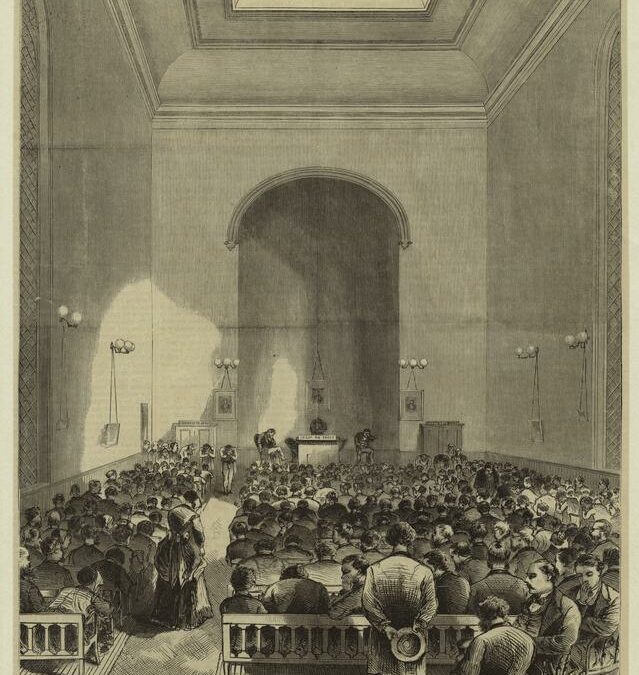
The Next Four Years and the American Church
On Wednesday, Joseph R. Biden, Jr. became the forty-sixth president of the United States despite a massive effort in recent days to prevent that from happening. The inauguration came off without a hitch, thanks in no small part to a considerable display of force in the presence of about 25,000 National Guard troops plus assorted law enforcement agencies at the ready. Their presence, while necessary, was really too bad. Two weeks earlier, the United States descended toward anarchy as a mob of protesters, some displaying Christian symbols, assailed the Capitol building and tried, unsuccessfully, to force things to be otherwise. Hopefully, calm will return now to Washington and the country can heal.
The next four years will bring significant changes both inside Washington and outside. Already, Biden has signed multiple executive orders repealing or reversing some of Trump’s pet projects. Work on the wall has stopped. DACA is back. And there is a softening of Trump’s LGBTQ agenda. This is just the beginning. My point today is not to address these and other anticipated political or cultural changes, though certainly changes in these areas will be significant, have far-reaching implications, and will cause many genuine believers anguish of soul. God fully knows what lies in store for the United States under a Biden presidency and God is sovereign over the process, whatever the actual details of the election. The goal of this essay is to suggest what the next four years should bring for the American evangelical church, if such can be said to exist at all.
Those who profess allegiance to the Bible and a belief in the redemptive work of Jesus Christ on the Cross have a renewed opportunity to allow the Church to be the Church again in our lost and dying world. We are to be a “city set on a hill,” a lamp on a lampstand, a lighthouse in the darkness pointing the way to Jesus Christ, individually and collectively. The darker the hour, the brighter our light ought to be. We have an opportunity to show forth and express our confidence in the God of heaven to lead us through and into the promised land despite the party in power. For what its worth, many Christians around the world bear up under more dire political governments and carry out their faith despite atheistic governments whose repressions far surpass anything the United States is likely to see in our immediate future.
We have duties to this new government despite our displeasure with those who make it up. We have a clear obligation to pray for and submit to those in power. Only when they order us directly to disobey God’s clear directive are we obligated to refuse to yield (Acts 5:29). By all means, Christians can use every legitimate opportunity to seek for change at the electoral level. However, we are currently now at least two years away from any real change. But our trust must always be in Almighty God for the outcome. He raises up one government while he brings down another (Dan. 2:21). Until God changes things more to our liking, we need to be respectful of and submissive to those whom God has placed over us. Our rhetoric must be biblical and Christlike.
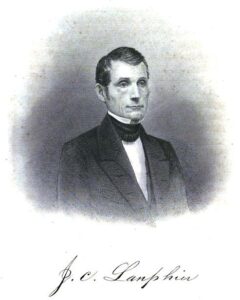 Prayer for those who rule is obligatory on the part of Christians (1 Tim. 2). The end goal of our prayer is pleasing God and the possibility of living a quiet and peaceful life. So, if God orders prayer and is pleased by prayer on behalf of our civil officials, why are we not more intentional about doing it? If the Church learns anything from these next four years, perhaps we can learn to always pray and not to faint or lose heart (Luk 18:1). As we pray, we should be mindful that the king’s heart is in the Lord’s hand, to direct it like He directs the flow of rivers (Prov. 21:1). A government can do nothing that God doesn’t allow. The entire book of Daniel speaks to God’s sovereignty over human governments and over its leaders. Daniel serves as a role model for the believer to follow when interacting with his government and his king.
Prayer for those who rule is obligatory on the part of Christians (1 Tim. 2). The end goal of our prayer is pleasing God and the possibility of living a quiet and peaceful life. So, if God orders prayer and is pleased by prayer on behalf of our civil officials, why are we not more intentional about doing it? If the Church learns anything from these next four years, perhaps we can learn to always pray and not to faint or lose heart (Luk 18:1). As we pray, we should be mindful that the king’s heart is in the Lord’s hand, to direct it like He directs the flow of rivers (Prov. 21:1). A government can do nothing that God doesn’t allow. The entire book of Daniel speaks to God’s sovereignty over human governments and over its leaders. Daniel serves as a role model for the believer to follow when interacting with his government and his king.
Where is the next Jeremiah Lanphier who will, without fanfare, initiate the next prayer revival such that prayer meetings will break out across our land pleading for the work of God among us? While we are praying and submitting, shouldn’t we also be about broadcasting the name of Jesus Christ across this land? Frankly, we are ambassadors living in a strange country, sent here to represent the king of another country. Our job is to represent Him to those of that foreign country. We are strangers and pilgrims, just passing through, enroute to a better place. Why are we caught up in the temporal circumstances of life? Of course, things are bad. And they will get worse before they get better. But as citizens of another country, we know that one day we will be united with our King in glory and the cares of this life will be a distant memory. The angst and political turmoil will be over as we will dwell in a house not made with hands, eternal in the heavens (2 Cor. 5:1).
It is time for the Church to be the church—”the pillar and buttress of the truth” (1 Tim 3:15). “O Church Arise and put your armour on. Hear the call of Christ our Captain” (Keith and Kristyn Getty). We ought to be a people who live before this lost and dying world in full assurance that He is in control. What a great marching song! There has never been a better time for the Church to be the Church—a light in the darkness. How will we respond to the need of the hour?
Hard days and rough waters may be before us. But these are only temporary. Jesus will preserve his own and bring us through to final victory. We should pray for our leaders, submit to them in every way we can, and stand up for God and his people while we wait for His promised return. Even so, come Lord Jesus.
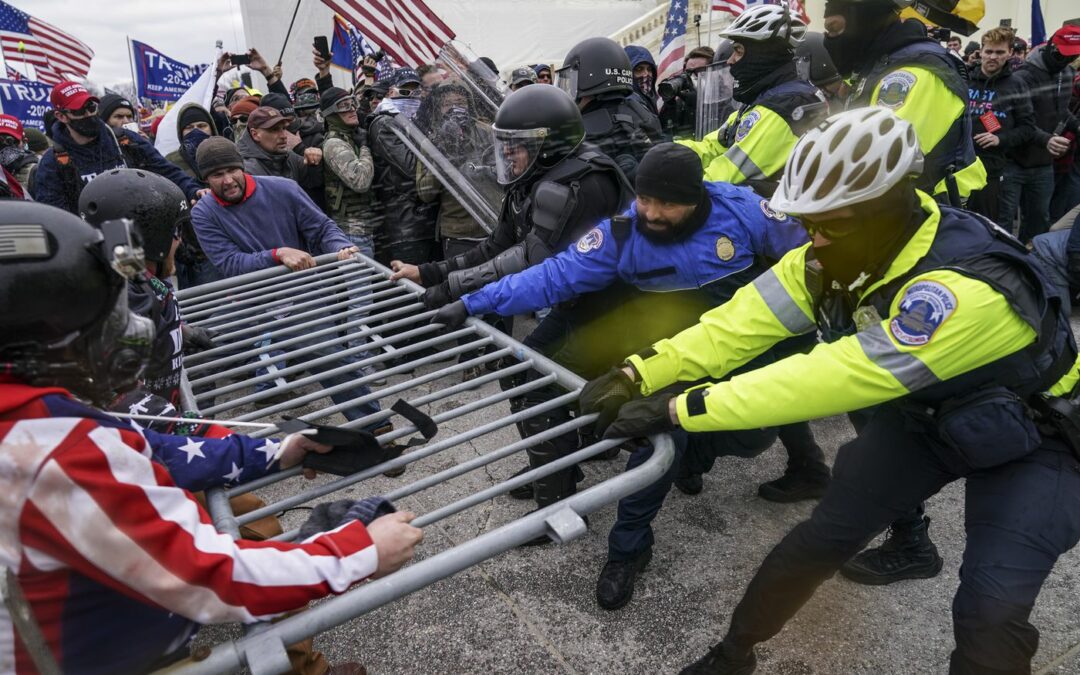
The End of the World?
Yesterday, two different people sent me a video from a Texas “apostle” informing his audience that the country will soon be under martial law. He has this on good authority from those “in the know” in Washington, D. C. The video, according to one source, had more than 300k views at the time of this writing. I have never heard of this fellow. Just how my two contacts, one from Georgia and the other, a local from the Twin Cities, came across the video is unclear. But it is apparently making the rounds. I choose not to post a link to the video lest I increase his audience and its attendant fearmongering. It is alarmist at best and really not helpful from a professed minister of the Gospel.
However, much has happened in the last week, from the storming of the United States Capitol building, seemingly with support from the highest levels of government to the banning of POTUS from Facebook and Twitter—a response I can both understand but profoundly regret. What happened on Wednesday, January 6, 2021, will go down in history as a low point in American life. Regardless of who one voted for in the election, this sort of response is hardly consistent with the American way, at least not in our relatively brief national history. I say “brief” as the United States is not yet two hundred and fifty years old. Ours is a short history when compared with China, whose national recorded identity goes back to the Shang Dynasty, more than 1000 years B. C.
America is a fragile nation which self-regulates. Paul Harvey reminded his audience nearly twenty years ago at the 2003 Landon Lecture that “Self-government won’t work without self-discipline.” We, the people, elect our leaders and we voluntarily choose to follow them. If we don’t submit to our system of government, then anarchy will result, bringing our fragile society to an end. Tragically, five people died as a consequence of the mob, with one being a Capitol police officer whose death seems to be attributed to the lawlessness. Yes, we have the right to keep and bear arms, but if we as a nation would choose to bear those arms against each other, the Civil War with its 600,000 plus deaths would pale in comparison with what might occur. The Battle of Gettysburg which took place on a small patch of ground outside the town of Gettysburg had about 180,000 combatants meet for three days in July 1863. There were 50,000 casualties—dead, wounded, missing or captured. More died after the battle than during it. God forbid we descend into this kind of civil strife. God forbid that the time comes when we, the people, think that bearing arms is the only way to stop what we think is going wrong. We are now engaged in another national discussion over the impeachment of a president—the second of his term coupled with a serious discussion of invoking the 25th amendment. Where all this will end, only God knows. God be merciful.
The other issue raised recently that is very lamentable is the banning of POTUS from Twitter and Facebook for inflammatory remarks. To add insult to injury Amazon, Google and Apple have all banned Parler from their platforms. Parler is a conservative social media app (which I do not use), said to be favored by the President’s supporters, and is now suing Amazon for its action. Indeed, Americans have the right to freedom of speech (the First Amendment to the Constitution), but that freedom does not extend to shouting “fire” in a crowded theatre without cause. A shout of fire may save lives if there is a fire, but it may cost lives in the ensuing panic if there isn’t one. So, did the President and some of his supporters shout fire or not? Many think he did. But the banning of POTUS completely from these social media platforms sets a dangerous precedent about which Christians should be concerned. If someone can inhibit the free speech of another, what does this do for people with religious conviction? We can see this already in countries like China where religious people (Christians, Muslims, and others) have their religious liberties controlled or limited by the government regularly. News came out today of Pastor Li Juncai who was given a five-year prison sentence and a fine equivalent to $32,400 for the crime of “objecting to the CCP’s (Chinese Communist Party) forcible cross removal and refusing to change a church proclamation ‘Love God and people’ to ‘Love the country.’” Sounds, in part, like a free speech issue, but China is not known for free speech.
Does all this sound like I am becoming a doom and gloom prophet? Is there not a cause, you say? Shouldn’t someone be “ready to ride and spread the alarm to every Middlesex village and farm, for the country folk to be up at arm?” (from Henry Wadsworth Longfellow, “The Midnight Ride of Paul Revere,” (1861).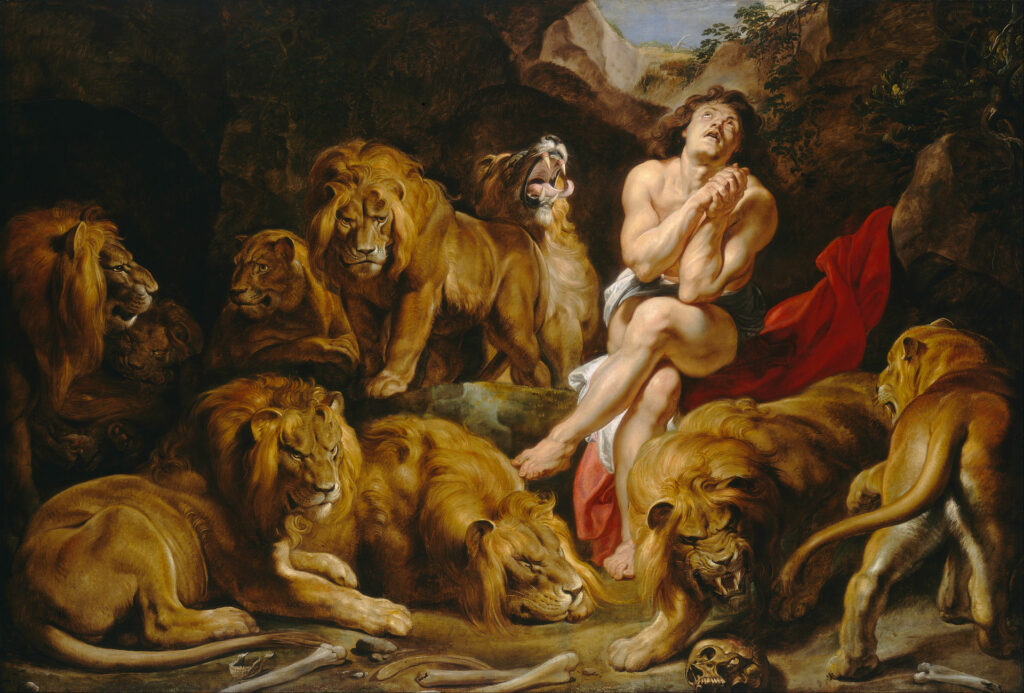
Hold the phone . . . wait a minute . . . take a deep breath! Did God suddenly fall asleep? Our trust as Christians is not in the political process, though we are deeply affected by it. Our hope is not in the next election or the next president or in our ability to defend ourselves. Maybe the preacher I mentioned at the beginning of this essay is correct and we will all be living under martial law within the month. I personally doubt this. But I’m not a prophet. Let’s assume for a moment that this is what’s going to happen. What could I possibly do to prevent it? Think of Daniel and the threat by civil authorities NOT to pray to any other god but Darius. What did he do? Did he panic or fret? He opened his window, and prayed toward Jerusalem, “just as he always had done” (Dan. 6:10). Nothing changed for him. He went on in quiet confidence, trusting God for the outcome. He was arrested and sentenced to death. We know “the rest of the story” to quote Paul Harvey again. God closed the mouths of the lions and gave Daniel a peaceful night’s rest, in contrast to the king who had a very bad night (v. 18).
We are warned that things are going to get worse before they get better, that “evil men and seducers shall wax worse and worse, deceiving, and being deceived” (2 Tim. 3:13). This doesn’t sound real promising. But Christians are on the winning side. We may not know the future, but we know who holds it. God controls the one who sits on the throne (Dan. 2:21) and God can bend a ruler’s heart to accomplish His divine will even against the ruler’s personal will (Prov. 21:1). Things that men mean for evil, God turns to good (Gen 50:20). This is my Father’s world! Let’s trust Him for tomorrow and focus on His will for us today!
One final comment regarding recent events. There has been some lampooning of these events on various social media platforms by Christians leaders. I get our penchant for humor; it can be a stress reliever. But I wonder is humor the best way to address these incidents? Humor has its place to be sure and I am not assuming that those who use humor are bad. I just appeal for caution here. We need to cry out to God for mercy . . . One man suggested that his church didn’t have a service as usual on Sunday but a prayer meeting. I applaud that as an appropriate response to such a national tragedy. May his tribe increase! I have been asked to fill a pulpit this coming Sunday. No matter what happens this week, the message will likely not be light-hearted. Hope-filled? Yes, but humorous, probably not. We need to call people’s attention to our soon coming King. Are they ready to meet Him? Are we ready? Even so, Come Lord Jesus!